USA NEEDS DIFFERENT ROADS TO THE TOP: Developing Players to Play Great Soccer
“This idea that one monolithic structure or one entity is going to be the panacea to finding the best, and developing the best — well, I just disagree with,” says Christian Lavers
Youth Soccer News: Elite Clubs National League, known in American youth soccer as ECNL, consists of two independent organizations: a girls league of 88 member clubs and a boys league of 71 member clubs. With a forward-thinking focus on player development, the Girls ECNL created the first pathway for developing elite girls youth soccer in our country in 2009, and the Boys ECNL was founded in 2017.
Nearly a decade before U.S. Soccer kicked off its Girls Development Academy, ECNL was raising the bar of training and establishing a professional playing environment for ‘Amazing Young Women’ and creating a pathway for developing the next generation of collegiate and professional women players in America. Nationally recognized for their significant accomplishment developing girls for collegiate soccer, 2018/19 is the tenth ECNL season.
Girls ECNL National events now include events in Phoenix (Fall & Spring), South Carolina, Florida, Texas, and New Jersey with the National Playoffs held in San Diego from June 25 – July 1, 2019. The Finals — known as the ECNL Final Four — are mid-July. Boys ECNL National Events include Oklahoma, Florida, San Diego, and Pennsylvania, with the top teams headed to the ENPL in the summer playoffs. The ENPL Playoffs in 2019 are in Illinois, and the ENPL Finals are also mid-July.
With a ten year run of leadership unprecedented on the girls’ side of American youth soccer, Christian Lavers has pioneered the development of elite girls soccer since 2009. As president of both Boys ECNL and Girls ECNL, Lavers oversees league which has approximately 24,000 youth soccer players.
A new series of interviews with Lavers starts with a look ahead — Part 1 ECNL’S CHRISTIAN LAVERS ON COACHING IN AMERICA – WE ALL HAVE TO DO BETTER is on Developing Thinking Players. Here is Part 2 on the role of ECNL in the landscape of youth soccer.
SoccerToday: A Conversation with Christian Lavers
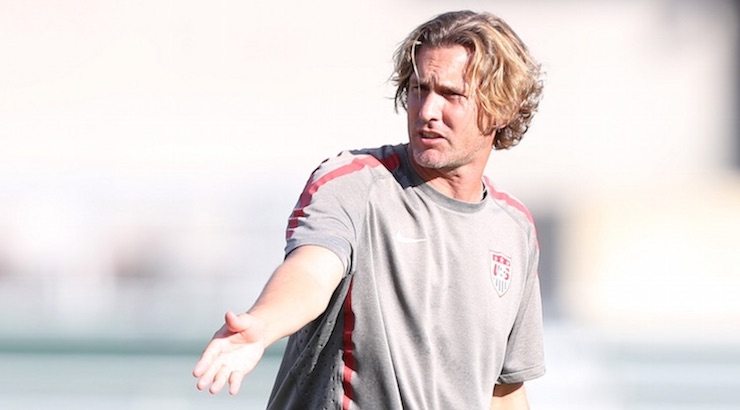
Read Articles on SoccerToday Written by Christian Lavers
Diane Scavuzzo: Where do you see ECNL today?
Christian Lavers: The ECNL — both the Boys ECNL and the Girls ECNL, is in a great spot. Every year, we evaluate what we’re doing in every aspect so that we can evolve, grow, and improve. On the girls’ side, this year, we added a new National Event to meet the needs of our member clubs and the player identification platform grew to incorporate players from the age of 13 to 18.
On the boys’ side, we also added a new National Event in Oklahoma in the fall, plus we are planning to expand our player identification platform over the next 12 months, and we are about to announce a new sponsor that will help us take a big step forward in all operations.
Most importantly, both the Boys ECNL and the Girls ECNL have great clubs across the country that are committed to always getting better, and who are bought into the core values that drive our league.
That is what makes our environment special.
And, ECNL’s Coaching Symposium has continued to distinguish itself with the quality of the people that we’ve brought into our symposium. (Held in Vegas, the program featured Kris Van Der Haegen, Director of Coach Education of the Royal Belgian Football Association, Fergus Connolly, an expert in team sports and human performance and Tom Byer, Head Technical Advisor for the Chinese School Football Program Office and Official CSF Grassroots Ambassador.) And we just had our second international trip to Europe in December, this time to Portugal to visit Benfica.
We want to make sure that we provide the resources for our clubs to do a better and better job of developing their players and coaches.
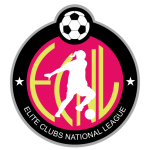
Diane Scavuzzo: Last year was monumental in many ways — several teams left the U.S. Soccer Girls DA to play exclusively in ECNL. Why do you believe the clubs chose to do this?
Christian Lavers: I think that youth soccer clubs want to do what is best for their players and in making those decisions they always ask themselves what are their players and families wanting out of the experience? Where do they think is the best fit?
For a variety of reasons, there were some very high profile clubs that tried the Development Academy platform and just decided that it wasn’t quite the right fit for their players, or for their clubs.
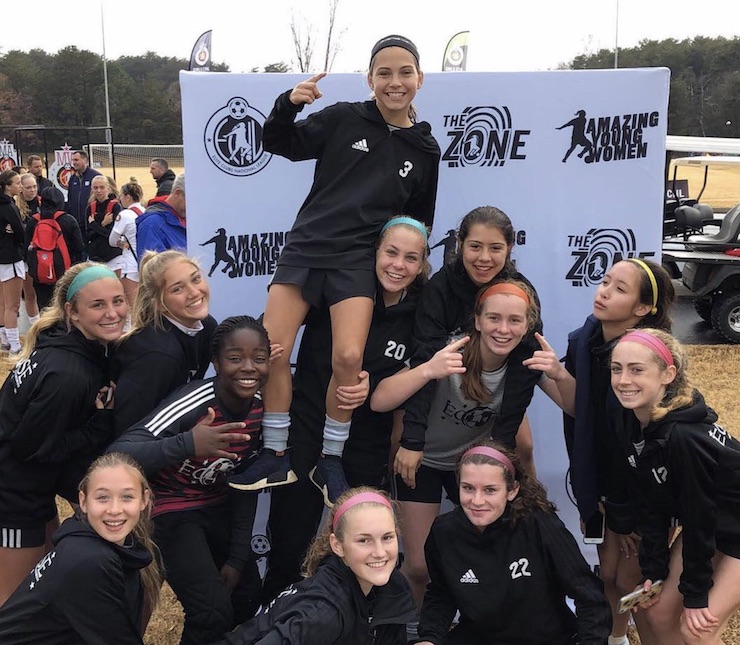
Diane Scavuzzo: ECNL has flourished regardless of the launch of the Girls DA. Do you think that scouting two elite girls programs in the USA is more difficult — since there’s not one clear path?
Christian Lavers: Well, I think the difficulty in scouting in this country has nothing to do with pathways and everything to do with our country’s size and geography.
In Portugal, which is somewhat a bit bigger than Rhode Island, the Portuguese pro club Benfica has nearly 60 scouts.
Diane Scavuzzo: California is 4 times bigger than Portugal …
Christian Lavers: Exactly, so the challenge in our country is that it’s huge. This idea that one monolithic structure or one entity is going to be the panacea to finding the best, and developing the best — well, I just disagree with. There’s going to be different pathways, different perspectives, different philosophies, and different roads to the top. And, there are going to be different backgrounds of people that get to the very top.
One pathway is just not realistic, and it’s also not the answer.
Our scouting challenge is to find the players in whatever pathway they exist, not to force round pegs into square holes or to pretend that there is only one road to excellence.
If anything, multiple pathways each getting better, each doing a better job in development, each with their own philosophy, and each attracting different types of players and clubs will maximize the number of top-level players in this country.
I recognize that creating that reality is just as big a challenge as scouting the whole country – but it doesn’t mean we shouldn’t aspire to both.
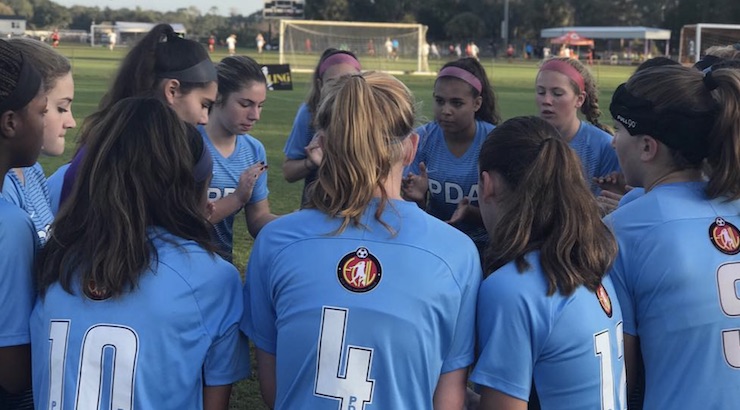
Diane Scavuzzo: What about clubs that were offering both ECNL and the Girls DA? Is that something that ECNL is not in favor of? There are only six clubs now that offer both …
Christian Lavers: We have standards of competition and quality that we expect our clubs to reach. I think the reality is that it is incredibly difficult to try and divide focus between two platforms that are very different and to have sufficient resources either from a player perspective, a coaching perspective, or a facility perspective to actually properly meet the demands of both different platforms that both aspire to develop players at the highest level.
The reality is that very, very few clubs can do this. One of those programs usually ends up taking a secondary position and that is not obviously consistent with our view of the ECNL platform.
Diane Scavuzzo: Do you believe that one of the reasons youth clubs left the DA is to let their players play high school soccer?
Christian Lavers: I’m sure that’s one of the reasons — I think most clubs now have some kids that play high school and others who don’t.
I think it’s important for people that players have choices.
Players should not be told there is no route to being great unless they follow a narrow path.
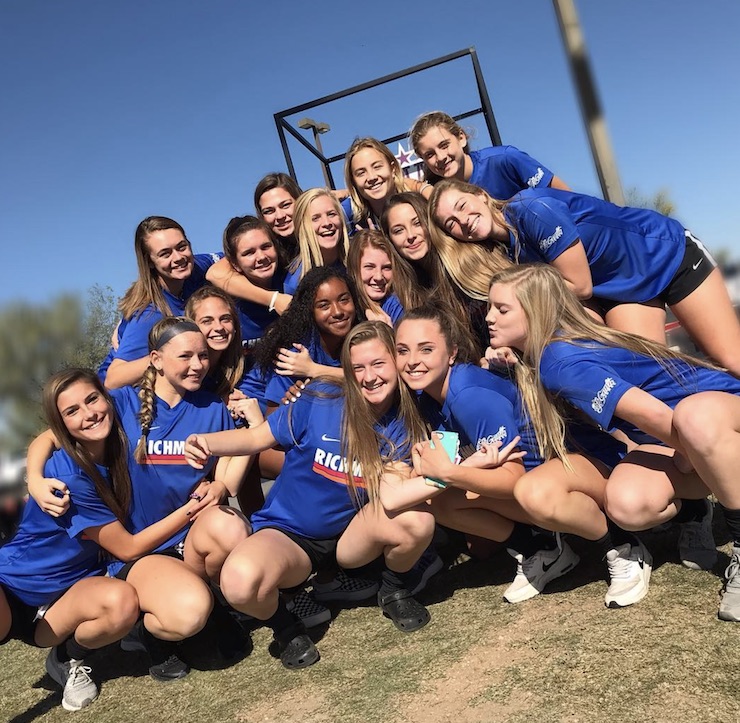
Diane Scavuzzo: What do you think about high school soccer?
Christian Lavers: I think it should be 100% up to the player. I think high school soccer has pros and cons, just like anything else and just as club soccer does.
It Should Be A Player’s Choice
There are some players who decide that high school doesn’t fit what they want and others who absolutely love the experience even if they don’t think the level is the same as they’re used to — they still love the other aspects of the experience.
And I really think that’s a decision that every kid and their family need to make — based on what they want.
Diane Scavuzzo: How often do ENCL teams train?
Christian Lavers: ECNL doesn’t have a mandatory training requirement because we don’t micromanage the club environment.
I know a lot of clubs train three times a week but have the opportunity for their players to train a fourth time or a fifth time if they want. Players should also have a choice as to whether they’re training three times, four times, or more because there are different levels of aspiration.
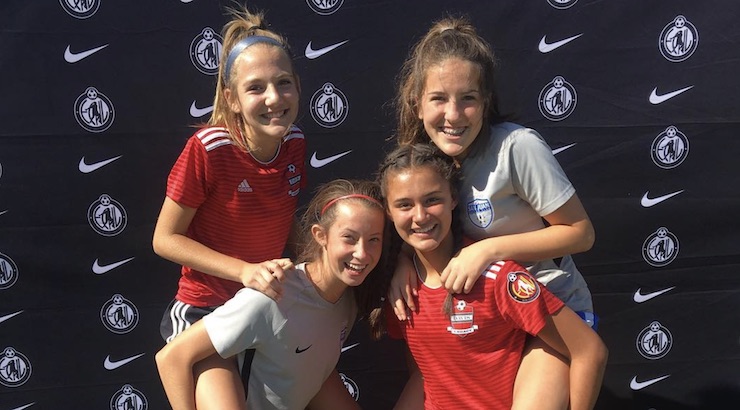
I would make the argument that if somebody’s driving an hour and a half each way to training, which is not totally uncommon in youth soccer all over our country, that they’re better off on that fourth day doing work on their own or something else besides sitting in the car for another three hours that day. Four practice training sessions per week are great for those players that want it.
I just don’t think this is something that any national body or any organization should be mandating to people.
I think our job is to supply resources and information to help provide a higher bar for people to reach in terms of development and competition. How they get there will be very different — because creating a soccer culture in Southern California is very, very different than establishing one in Milwaukee, or anywhere else.
My belief is if people work hard, they’ll figure it out. They don’t need somebody telling them what they have to do or what they can’t do.
Diane Scavuzzo: Do you think the goals of ECNL are very different than the goals of the Girls DA? Both organizations are focused on developing players to be the best that they can be, right?
Christian Lavers: Yes, so in that regard, I’m sure their goals are very similar. There’s just a different perspective, and that doesn’t have to be a right or a wrong.
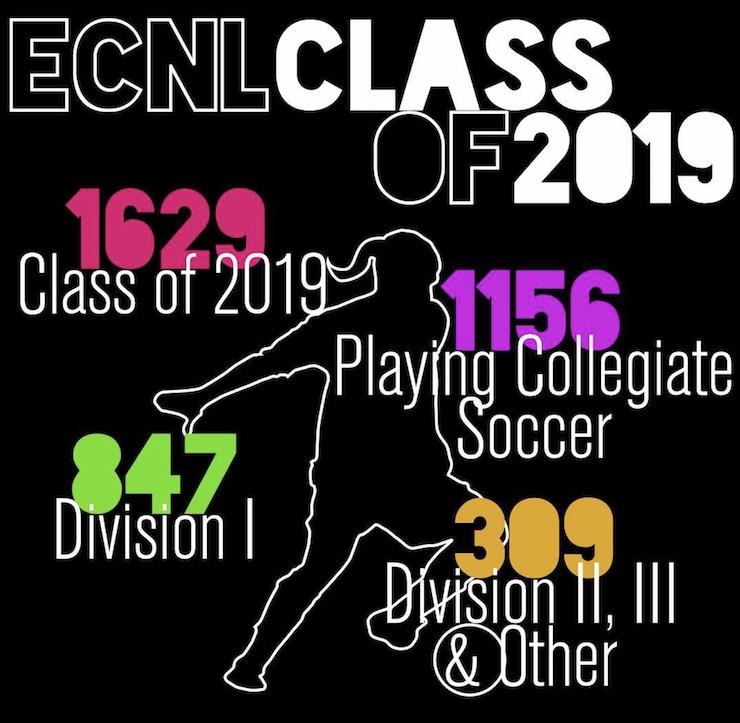
Diane Scavuzzo: ECNL is well known for developing top collegiate players. There is a push on the boys’ side to have U18 players take a gap year or sign with a USL team instead of playing college soccer. How do you believe college fits in on the girls’ side today and is that changing?
Christian Lavers: I don’t expect the focus on college to change for a very long time, if ever.
I think college soccer is the next step for 99% of players in this country.
College plays an important role in the preparation for a career outside of the game and the emotional maturation that occurs in college is critically important.
The vast majority of people playing college soccer will ultimately end up in a different career than soccer. Even for those who end up in a career in soccer, and I’ll put myself in this group, the education that is received through college or grad school is incredibly important.
People look at other countries and think everything’s perfect and often they don’t look at the cost to the players who don’t make it to the top and have no fallback plan.
READ: Christian Lavers on IDENTIFYING & WATCHING A DEVELOPMENTAL SABOTEUR
Those are the players who are left behind — and, there’s study after study talking about the human cost to those who sacrifice everything, give up everything for the goal to be a professional, and the percentages of making it are minuscule.
We really need to say, “We have to be very, very careful to make sure that when we set out these opportunities, or inspire these dreams and ambitions, that we’re helping people do whatever they can to achieve their goal, but not in a way that if they fail, they are left with nothing.”
It is a false dichotomy to imply excellence on the field absolutely has to come at the expense of excellence in another area of life.
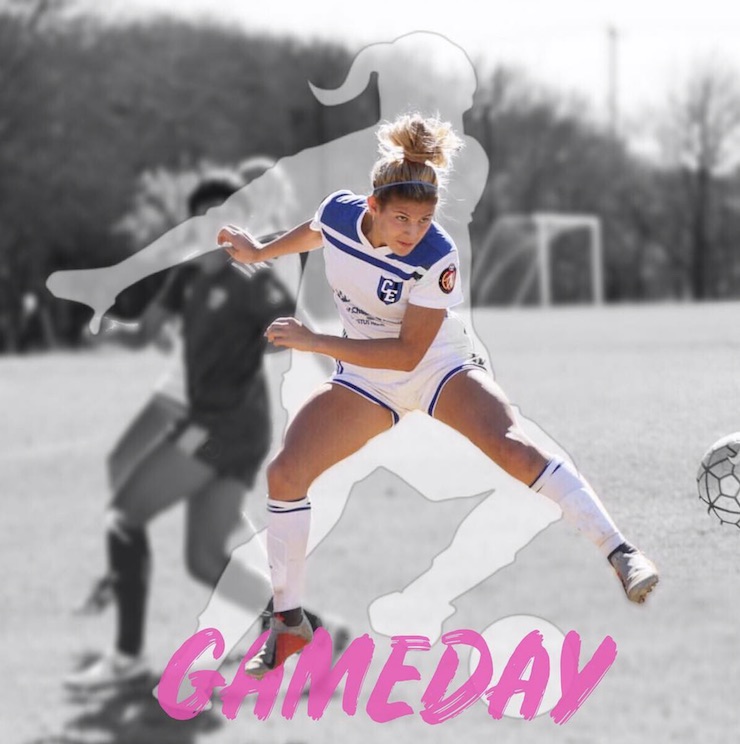
Diane Scavuzzo: What is your advice for parents? If you had a daughter …
Christian Lavers: I don’t have a young daughter, but I have a young son and another one coming any week – but the answer is the same regardless of gender. The first thing I would say is the player has to love the sport — because that’s what’s going to drive them to work and train.
My advice to parents? Find the environment where your child is enjoying it, where he or she is learning, and where he or she is being challenged. Those are three different criteria for a great environment.
The ideal path is to be in an environment that she loves.
She needs to be in an environment that she chooses to be in because she wants it.
Diane Scavuzzo: So you’re not going to qualitatively, completely say ECNL’s better?
Christian Lavers: Well, it would be philosophically deceptive if I said, “Oh yeah, this one path is the perfect path for everybody.” Because that’s not possible.
Diane Scavuzzo: You’re just so wonderfully, holistically consistent and ethical. I love it.
Christian Lavers: You cannot pretend to know what is right for every single player in the country purely because you’ve got a special degree, or you’ve got a nice brand, or you have a big flag waving behind you.
It has to be individualistic because that is our nature as humans.
Read: SoccerToday’s Interview With ECNL’s Christian Lavers – Part 1 COACHING IN AMERICA – WE ALL HAVE TO DO BETTER
Images: Thanks to ECNL Instagram






